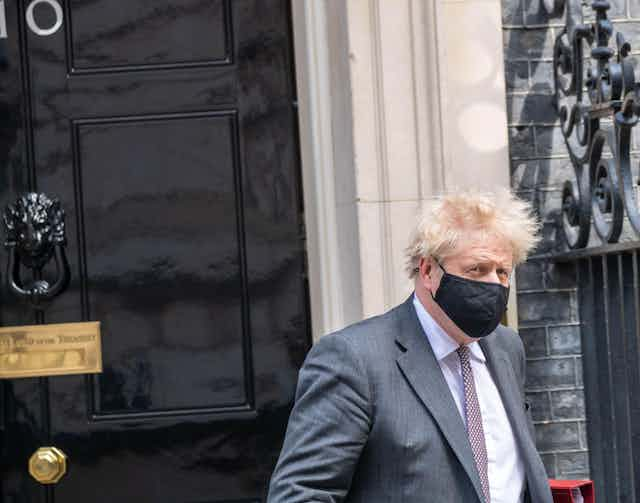Many people might wonder how it can possibly be that none of the UK officials (former or past) currently facing questions about their role in lobbying appear to have broken any rules. A quick look through the legislation reveals why.
First there was the Greensill scandal, in which former prime minister David Cameron texted government ministers on behalf of the financial firm that was employing him. Then there was Bill Crothers, the senior civil servant who was found to have had a second job at Greensill. Then it was revealed that Boris Johnson, the current prime minister, had been texting with businessman James Dyson about UK tax laws.
Cameron has apologised. Crothers claims to have done nothing wrong and Johnson says he will “make no apology” for his actions.
These events have laid bare the inadequacy of the laws and institutions that are supposed to ensure fairness and transparency in the UK. No-one involved in this scandal appears to have broken the law. Cameron’s actions were not covered by legislation regulating the lobbying industry. Crothers’s appointment to Greensill was apparently approved by the Cabinet Office. And it’s not against the law for a businessman to text the prime minister.
Read more: David Cameron and Greensill: this toothless regulator is absurdly easy to sidestep
Lord Pickles, the chair of the Advisory Committee for Business Appointments which oversees the rules on former government officials taking new jobs, admitted that the committee has almost no power and is limited to providing advice “which is often not sought”. The Office of the Registrar of Consultant Lobbyists, charged with managing the statutory register of lobbyists established in 2015, has very limited powers and is headed by a part-time civil servant.
Weak laws
The institutions charged with enforcing the rules are not up to the job but neither are the rules themselves. Cameron introduced legislation in 2014 in order to shine “the light of transparency” on lobbying which he said was “the next big scandal waiting to happen” to British politics. The plan was to clean up lobbying and ensure that the voices of smaller groups didn’t get drowned out by bigger, wealthier groups.

Not only did the legislation fail to do any of these things, it made everything much worse. For a start, only lobbyists working for private sector consultancy firms are required to sign the statutory register. This group comprises roughly 1% of practising UK lobbyists.
Lobbyists working in-house for large corporations are exempt, creating the bizarre situation in which consultants are covered by the law, while in-house lobbyists, who may be working for the very same organisation, are not. This is why Cameron could get away with doing what he did: he was an employee of Greensill, not a consultant, and so wasn’t covered by the law.
What’s more, only a minute fraction of lobbying activity has to be reported. Face-to-face meetings between consultants and government need to be logged but no consideration is given to any of the myriad ways in which public affairs professionals and campaigners seek to influence policy decisions beyond such meetings. Lobbying is a huge and professional industry, employing hundreds of people whose job is to work with politicians, lawyers, the media and other experts to raise concerns on behalf of businesses, but also think tanks, trade associations, campaign organisations, professional bodies, trade unions and many others.
Professional lobbyists don’t tend to do what Cameron did, which is lobbying in its basest and crudest form. They work with a range of stakeholders to get issues on the agenda, to raise concerns on the public stage, and to seek change. Meeting with politicians or civil servants is only one small part of an effective public affairs campaign.
And the law doesn’t even require this small part of the process to be fully monitored. Only meetings between consultants and ministers or permanent secretaries are deemed important enough. Meetings between lobbyists and other government officials – including special advisers and civil servants more junior than permanent secretaries are excluded.
To be clear, there are currently over 400,000 full-time civil servants working across all government departments, 44 of whom have the title of permanent secretary or second permanent secretary. The Lobbying Act therefore succeeds only in “shining the light of transparency” on the activities of 97 ministers, 1% of lobbyists and 0.01% of civil servants.
Tightening the loopholes
Meanwhile, the law imposes strict limits on the activities of smaller organisations, like charities, and on the ways trade unions can campaign and raise funds. Small organisations are prevented from political campaigning at the time when governments and MPs are most receptive – the run-up to a general election – because this is deemed as interfering in the electoral process.
At the very least, rules need to be expanded to include everyone who is in the business of lobbying government, including consultants, in-house lobbyists for businesses, campaign organisations, charities and think tanks.
New rules are needed on the allocation of government contracts, and there must be transparency around the private interests of civil servants and MPs in order to ensure against conflicts of interest. Lobbying can have benefits but if its positive role is to be harnessed, the law must apply to lobbying as it actually exists, not a tiny subsection of it. And there must be stiff punishments for individuals and organisations who break the rules.
The most profound damage wrought by Cameron, Johnson and all the others involved in this fiasco is, perhaps, the long-term corrosive effect that these and other scandals have on public trust. Democracy needs the people, just as the people need trustworthy politicians. But the people have increasingly switched off from politics, preferring to believe that politicians are only out for themselves. As voter turnout as well as wider participation in politics remain low, it is hard in current circumstances to argue with them.

